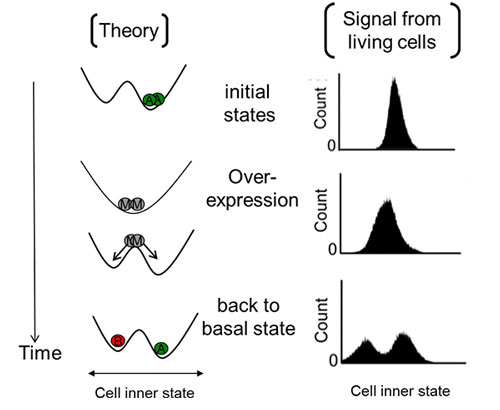| May 15, 2015 |
Synthetic biology reveals mechanism of gene-overexpression to induce cell reprogramming
|
|
(Nanowerk News) In iPS technology, gene overexpression of the four genes can induce reprogramming of a cell from differentiated state to stem cell state.
|
|
However, the mechanism of reprogramming via gene-overexpression remains unclear in spite of the reproducibility of iPS technology.
|
|
Now, Daisuke Kiga, Kana Ishimatsu and colleagues at Tokyo Tech and RIKEN have devised a theoretical expression of cell reprograming and proved the idea by using synthetic-biology experiments where simplified genetic circuits were constructed in living cells (ACS Synthetic Biology, "General applicability of synthetic gene-overexpression for cell-type ratio control via reprogramming").
|
 |
| Temporal monostable system induced by gene-over expression can divide a cell population at basal state into two.
|
|
The artificial genetic circuit consists of bistable basal switch and tunable over-producing system. Modulated induction of over-expression temporarily creates a monostable system and thus easily controls the inner state of those cells with the circuit. When cells with one of the basal two steady states are modulated, their cell-inner states around the watershed of basal bistable system are affected by the potential landscape of the genetic circuit. In addition to the effect, fluctuation of the bio-reaction divides the cell populations into two.
|
|
This cell culture experiment demonstrates that the fine and subtle manipulation of the initial cell states, through the regulation of gene-overexpression levels, results in the generation of programmable bimodal distribution from monomodal distribution.
|
|
The team's mathematical analysis further suggests that the reprograming strategy can be applied to various types of natural gene networks.
|

